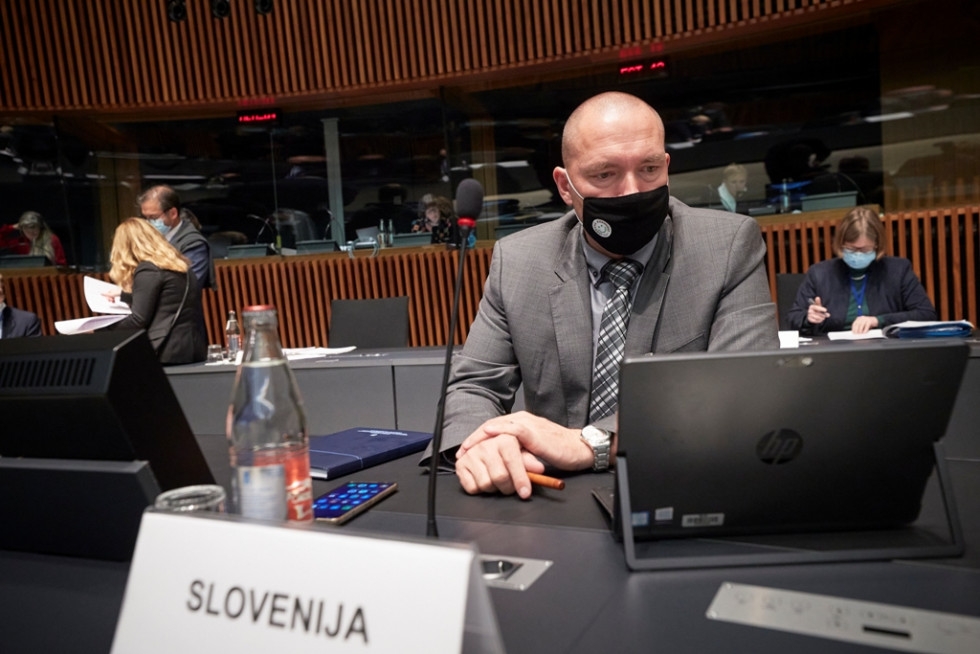Early this morning, the EU Agriculture and Fisheries Council reached agreement on the general approach to the Common Agricultural Policy (CAP) reform beyond 2020 legislative package. This is an important achievement as the agreement facilitates opening the negotiations with the European Parliament. On behalf of Slovenia, the meeting was attended by the Minister of Agriculture, Forestry and Food, Dr Jože Podgoršek, who earmarked the compromise as extremely important achievement within the EU for the entire agricultural sector. “It is most important that we, the ministers, have come to an agreement that facilitates the continuation of the demanding CAP reform process and its subsequent timely implementation. In negotiations, Slovenia succeeded in ensuring the essential elements for the development of agriculture in Slovenia, while simultaneously following the environmental protection guidelines. Particular attention has been on small farmers in terms of reducing the administrative burdens.” At the meeting that commenced on Monday, the ministers discussed certain other topics in agriculture and fisheries.
Adopting the legislative framework for the future CAP is important in terms of the timely preparation of programme documents at national levels, so it is crucial that this legislative framework become stable and valid as soon as possible. In this regard, it is also essential that a multiannual financial framework for the period 2021–2027 be adopted as soon as possible, so that the implementation of the reformed CAP can begin.
In the process of negotiations, Slovenia has invariably advocated an ambitious CAP concerning the environment and climate change to help generate incentives for a more sustainable agricultural production. At the same time, Slovenia reiterates that solutions of new green architecture be balanced and proportionate.
The more prominent areas in negotiations for the Slovenian agriculture, food industry and rural development include:
- Scheme for the climate and the environment, the so-called environmental scheme
- Possibility of taking into account Slovenia’s endeavours for the environment and nature through the Rural Development Programme in implementing the environmental scheme in the 1st pillar.
- Additionally, financial flexibility in the first two years, enabling Slovenia to avoid losing the CAP funds due to possible poorer inclusion of farmers into the new environmental scheme (as long as they have no experience with the new measure).
- Slovenia has relatively sufficient flexibility for programming such environmental scheme.
- Conditionality
- Great progress has been made in flexibility of Slovenia and its farmers in the light of the Good Agricultural and Environmental Conditions (GAEC) standards applicable to agricultural land.
- Slovenia will be able to adapt certain requirements to its specificities and in particular to small farmers.
- Production-linked subsidies
- Scope of funds intended for the production-linked payments within the 1st pillar equals 13+2 %, which is more than the initial Commission’s proposal (10+2); for Slovenia, this has been one of the more prominent and incessantly striven for issues.
- Re-allocation payment
- It is most crucial for Slovenia that the introduction of the re-allocation payment is voluntary for the Member States, and that we will be able to address the issue of equitable direct payment allocation based on status analysis also with other measures, including rural development.
- Sectoral interventions
- A most important achievement is that producer groups not organised within producer organisations (POs) will be in a position to make sectoral interventions in other sectors (like fruit and vegetables) or that transformation into POs of other integration forms will be feasible within the transitional period – where any intervention type will be possible, including the crisis prevention and control measures in the subsequent programme period, and in the manner available to producer organisations (POs).
- For Slovenia, this is a good and development-oriented achievement in the endeavours for better organisation of producers.
- New implementation model
- The compromise text reflects Slovenia’s comments and repeated highlighting of administrative burdens and feasibility of the system as envisaged by the Commission.
- Instead of annual efficiency evaluation of measures, based on output and result indicators, for all the specific targets, the bi-annual evaluation is envisaged, taking annual reports on result indicator values as basis.
- System of checks and controls
- A most important achievement for Slovenia is that the system of checks and controls may be simplified in the light of conditionality for small farms.
On the first meeting day, the EU Ministers endorsed the Council’s conclusions on the “From-Farm-To-Fork” Strategy, advocating the development of sustainable alimentary system, from production to consumption. The conclusions highlight the fundamental Strategy goal as the framework for development of sustainable, integrated and circular alimentary system, and for attaining the climate neutrality and biodiversity goals. Importance of the EU’s endeavours in preserving and restoring a healthy environment was highlighted, where the Member States are facing a great challenge of reducing the use of plant protection products (PPPs), antimicrobials and mineral fertilisers, all of which will require developing new and more appropriate technologies. As important areas in conjunction with the sustainability aspect and the environmental aspect, the conclusions highlight the food scraps and food waste, improving the resilience and sustainability of the food chain, shortening of the supply chains, strengthening the system of protection of geographical provenance, strengthening the status of the farmer in the supply chain, drawing up the Code, and implementing the controls. The Minister underlined in this context that transition would not be easy and that higher future investments into measures, knowledge, digitalisation, information technology, and into reduced use of plant protection products, fertilisers and antibiotics through application of new technologies would be imperative.
On the first day of its meeting, the EU Council unanimously adopted Council Regulation fixing the fishing opportunities for 2021 for certain fish stocks and groups of fish stocks applicable in the Baltic Sea. The Regulation is part of a long-term approach to adapting and maintaining sustainable fishing levels.

